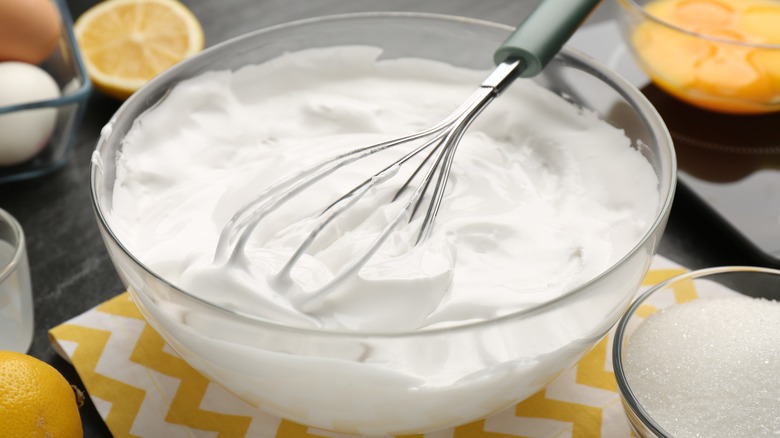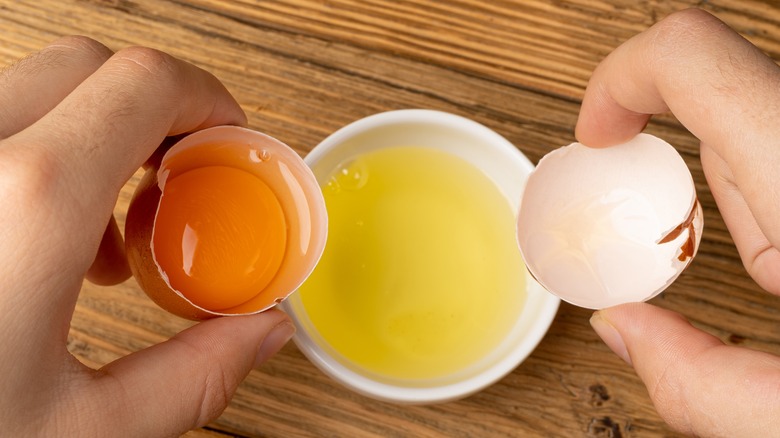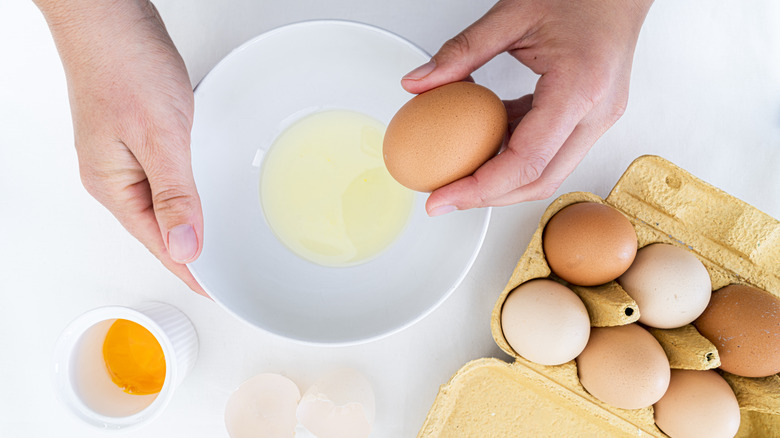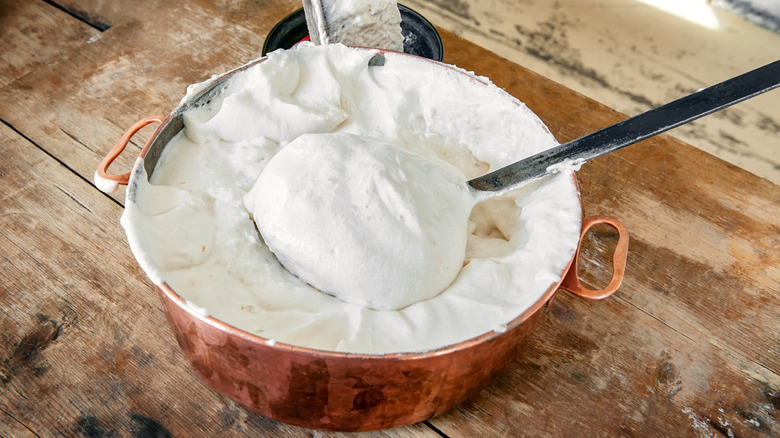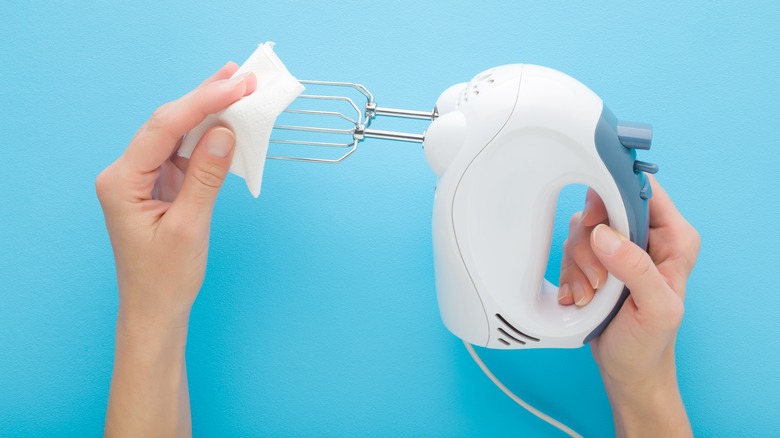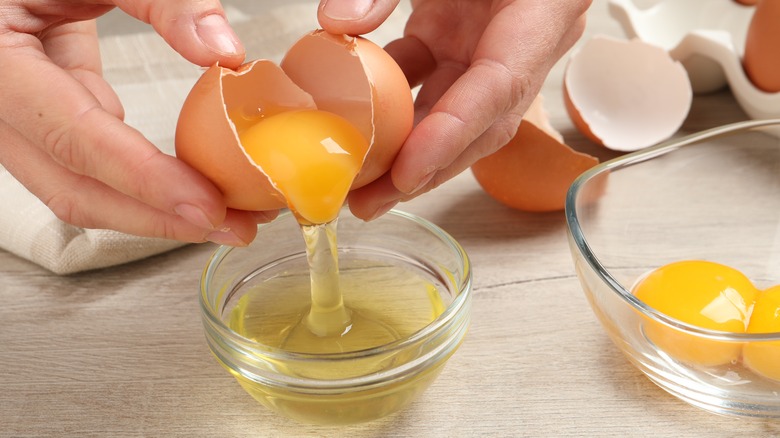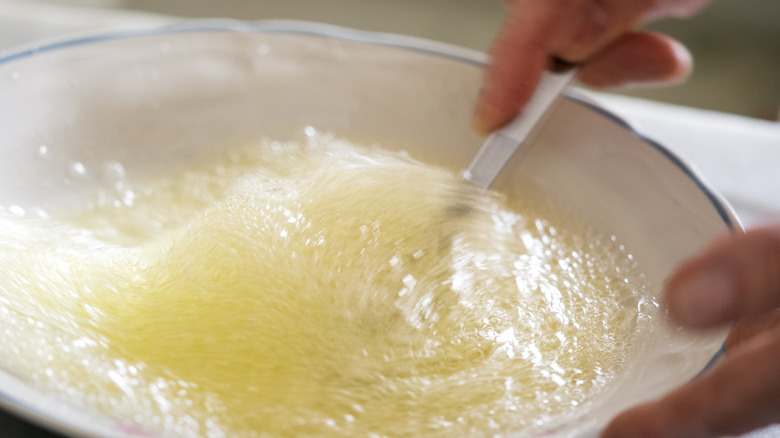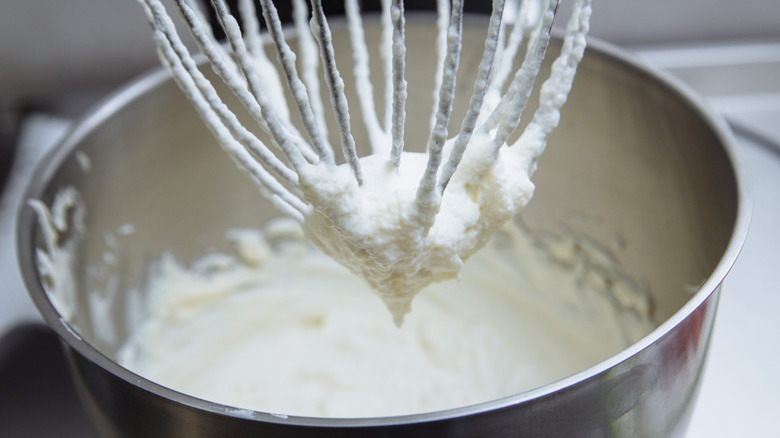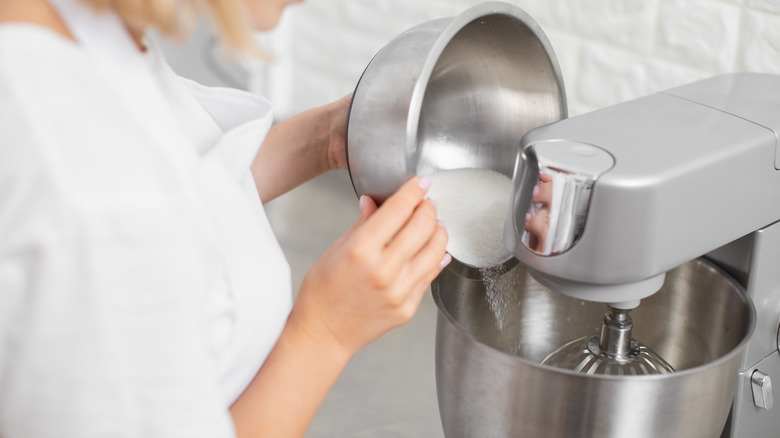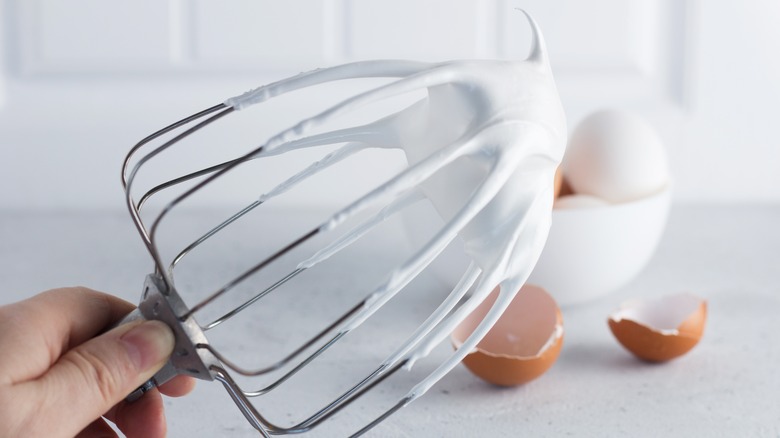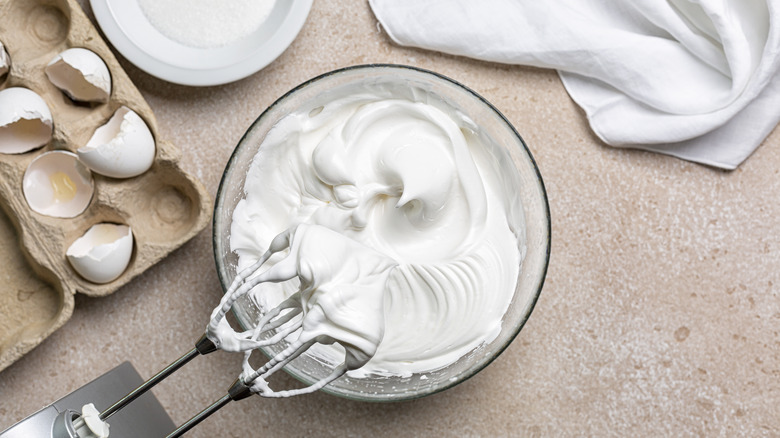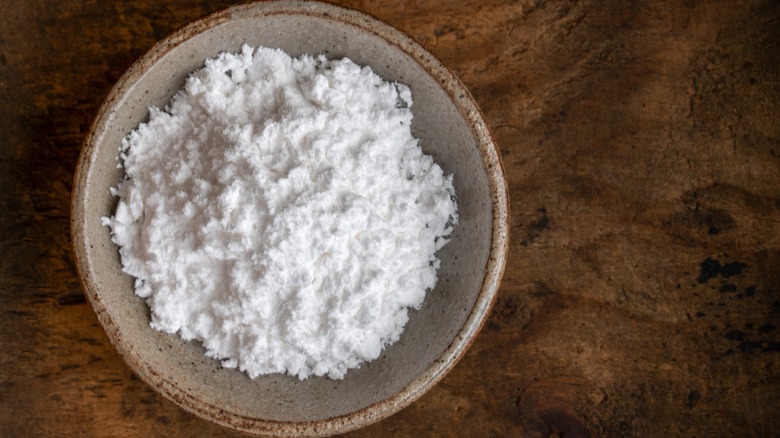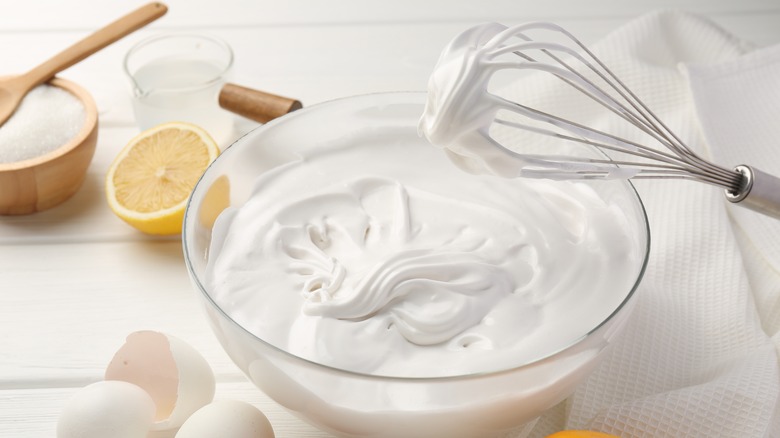The Ultimate Guide To Whipping Egg Whites
Whipping egg whites is one of the basic culinary techniques. When done properly, the eggs increase in volume and attain a unique texture that, despite being light and airy, manages to hold form. Beating the eggs with sugar makes wonderfully glossy meringues that can be made into cookies and piped on pies, but they also lend those feather-light qualities to mousse, soufflé, or classic cake sponges. Despite being an omnipresent element in pastry making, it's also one of the most finicky ones to master, as success depends on many factors, including things such as the temperature of the eggs and the cleanliness of your equipment. Failing to fulfill the requirements leads to flat and weeping meringues, causing collapsed, dense, and chewy desserts.
To prevent mistakes from happening and to ensure that every batch of whipped egg whites comes out perfectly, we created the ultimate guide that will take you through all the steps of the process. To ensure we covered all the basics, we called in on professionals to reveal their tips and tricks for perfect meringues. We interviewed four pastry chefs who revealed the secrets of the trade, so next time you want to make French meringue cookies or the legendary Pavlova cake, use this guide as a reliable reference that will help you perfect the art of whipping egg whites.
It's best to use fresh eggs
The fresher the better is a common culinary phrase that also seems to apply to egg whites, especially those you're planning to whip. Pastry experts agree that fresh eggs give the best results, which is particularly evident in the stability of whipped egg whites.
Elisa Lyew, a New York City pastry chef who whips up premium gluten-free treats at Elisa's Love Bites, explained: "Fresh egg whites have a thicker consistency and a lower pH, which allows them to hold air better and create more stable foam." She added that with time, egg whites will lose thickness, so they can't achieve the same volume as fresh eggs. Cathy Asapahu, a co-owner and pastry chef at Ayara Thai, further clarified that aged egg whites can whip up faster, but stability is usually the issue. She also mentioned that water tends to separate faster with aged egg whites, again influencing stability. Valerie Mahoney, the pastry sous chef at The Langham Hotel London, also warns that aged egg whites are likely to collapse when you fold them in with other ingredients, especially when mixed with heavier sponge batter. If the egg whites collapse, your sponge will likely be heavy, thick, and chewy.
For Mahoney, fresh eggs are the first choice, but if you don't have any, she recommends packaged or carton egg whites, though she added that "due to the pasteurization process, they will not create as stable of a meringue as fresh whites."
Room temperature eggs whip up faster
Besides using fresh eggs, if you want to be sure that the egg whites will whip up properly, you should use room-temperature eggs. The secret is in the proteins. "Warmer or room-temperature eggs tend to whip up more easily and reach a greater volume because the proteins in the whites can unfold and form air bubbles more readily at this temperature," explains pastry chef and recipe developer Emily Laurae Carter. She adds that this light and airy texture is important as it will translate into your final products. You want to be especially careful if you're trying to make meringues, soufflé, or similar bakes where you need air for texture and volume.
Elisa Lyew recommends leaving the eggs for at least 30 minutes outside the fridge to achieve the right temperature, but if you are forgetful, Cathy Asapahu has a simple and effective method. As she explains, "I paddle the egg whites around in a metal bowl for 3–5 minutes to take the chill off, then proceed to whipping."
It should be mentioned that using cold eggs is not a serious mistake in pastry making. They can also whip up into a stable mix, but as our experts explain, it will take more time to achieve the ideal volume and stability.
The material of the bowl matters
Once you gather the best eggs and get them to the ideal working temperature, it's time to start assembling all the equipment you will need to whip the egg whites and the first thing on the list is to choose a bowl that's made from stainless steel, glass, ceramic, or copper. Our experts claim these materials are ideal for beating egg whites as they won't sabotage the process.
Stainless steel and glass are perhaps the two most common choices because stand mixers usually use these materials for their bowls. They are durable, reliable, and great all-around options you can always rely on to whip perfectly decent meringue. However, our experts explain that copper is the superior bowl material for whipping egg whites. "When the copper reacts with the proteins in the egg whites, it creates very strong molecular bonds that yield stable and glossy meringue that is very resistant to overwhipping," explained Cathy Asapahu, while Elisa Lyew confirmed that the copper will always give "top-notch" results.
Plastic is the material you want to avoid. As Chef Valerie Mahoney explained, "Plastic bowls are not a great option as they tend to hold onto fat and develop a thin coating over time." As egg whites won't whip up properly if they come in contact with fat, avoid plastic so you don't end up with frothy egg whites and zero volume.
Make sure all the equipment you're using is clean
When it comes to tools, our experts agreed that the critical thing is keeping all the equipment clean. "Having any residue of protein or grease (like butter left over from a previous mix) can seriously hamper the volume and stability of the meringue," explained Cathy Asapahu. Valerie Mahoney adds that fat such as oil or butter coats the proteins of the egg whites, so they simply can't achieve volume or hold stability. Elisa Lyew agreed, claiming that even the smallest amount can leave you with flat egg whites. She also mentioned that even detergent residue can be the culprit as it prevents egg whites from whipping up properly.
Before you start, make sure that the whisk and bowl you plan to use are perfectly clean. The easiest way to do this is to wipe everything with a clean kitchen towel, but if you want to be sure everything is spotless, Asapahu recommends using white vinegar. She explained that after washing, you can do an extra step and wipe your equipment with a bit of white vinegar.
Don't let the yolk get into the egg whites
Separating whites from the yolks seems like a minor task, but our experts emphasize that this is one of the most important steps in the process, as the yolk should never come in contact with the egg whites you want to whip. Egg yolk is very tender and sensitive, and even the lightest motion can break it, allowing it to bleed into your pristine egg whites. "Keeping the yolks out of the whites is very important as the yolks contain fat and fat prevents the whites from whipping," explains Valerie Mahoney, while Cathy Asapahu emphasizes that even a trace of fat will prevent the whites from foaming properly.
Whichever straining technique you use, Elisa Lyew and Asapahu advise using an extra bowl to strain each egg white separately before adding it to the mixing bowl. Otherwise, one tainted egg white might ruin the whole batch. If you have a broken egg yolk, there is no way to fix it. Emily Laurae Carter suggests leaving the broken egg on the side and using another for your whipped egg whites.
Start slow and be patient
When you're ready to whip the egg whites, don't start on high speed. In the beginning, it's best to start slow as this is the stage where you need to break the protein bonds to let the air in. Once the egg whites loosen up and become frothy, you can increase the speed as the mix is ready to incorporate more air. As Cathy Asapahu explains, "I find that if you slow down the mixer speed a bit, the air bubbles created in the meringue are finer, leading to glossier and more stable meringues." She also added that if she's whipping up a classic sugar meringue, she increases the speed once she adds sugar.
Another thing you need to have in mind is that egg whites require some time, especially if you need to get to those stiff, firm peaks. Elisa Lyew claims, "Patience is key when whipping egg whites," so designate enough time for the process. As egg whites are so finicky and influenced by many things, it's difficult to estimate how much time they need to reach the desired form. The best advice is to keep your eye on the mix and stop when you think it's ready. A rough estimate is that the egg whites will need around 8 minutes to reach the stiff peak phase.
Don't let the eggs overwhip
With whipped egg whites, we are usually concerned about beating them enough so they hold form, but many forget that overwhipping is surprisingly common and that it can ruin the texture and structure of the final product. Egg whites are overmixed when you keep beating them after the peaks are firm and glossy. Valerie Mahoney explains this is when "they become stiff and unable to retain moisture." Cathy Asapahu explains that they "will appear grainy and dry," while Mahoney adds they might lose structure, separate, and look "curdled."
The main problem with overwhipped egg whites is not the looks. As our pastry experts explain, they will most likely negatively affect the texture of the final product. Elisa Lyew explains they are more difficult to blend in and might make "dense, flat, rubbery texture" bakes. They can also cause structural problems. "Overwhipped whites can make meringues less crisp or even collapse when baking," explains Mahoney. The only solution is to stop mixing when your egg whites achieve ideal stiffness. This can also vary depending on the recipe — not every dish calls for stiff peaks. So, make sure you know what you're aiming for in a particular recipe.
Add sugar in stages and start when the eggs are frothy
Not every recipe will require adding sugar to whipped egg whites, but if you come across one that does, make sure to add the sugar later, and don't throw in everything at once. Our experts suggest several techniques. Elisa Lyew waits to get the egg whites to the soft peak stage and then adds a tablespoon at a time. "Before adding in any sugar, you should whip your whites until they are foamy throughout, meaning that when you look at where the whip hits the bottom of the bowl in the middle, you see foam," shares Valerie Mahoney. Her preference is to add ⅓ of the amount at a time. Cathy Asapahu also follows the same techniques of adding sugar in three stages, waiting at least 30 seconds before adding another batch. She also waits for the egg whites to get to the frothy, soft peak stage before throwing in sugar.
Typically, sugar is required if you're making meringues or light sponge desserts based on egg whites such as chiffon or angel food cake. In most cases, these recipes require caster or superfine sugar because, as Mahoney explained, they incorporate much better than granulated. She also added you should not panic if you throw everything in at once. The meringue will take time to work through all the sugar, but it will reach glossy peaks.
Ideally, make sure there is no humidity
Even the environment will affect the result of your whipped egg whites, particularly if you try to whip up your meringues on a humid day, as humidity seems to be the biggest enemy for egg whites. "In a humid environment, the air has more moisture, which can prevent the egg whites from drying out and forming a stable foam," explains Elisa Lyew. This means that the eggs will require more time to reach desired consistency. Valerie Mahoney also added that humidity can be problematic when baking meringues. "Because meringue is made up of egg whites and sugar, and sugar is hygroscopic meaning it clings onto moisture, when humidity is present, it will cause the sugar to absorb outside moisture," she clarified.
If you're working on a very humid day, Lyew suggests finding a dry and cool place to whip the eggs. She also recommends refraining from boiling anything before or during whipping to minimize humidity. Mahoney's advice is to add a teaspoon of cornstarch to the sugar you're planning to use, as it works great for soaking extra moisture. Cathy Asapahu mentions that turning on the air conditioning can be a good solution, and if you live in a very humid area, getting a dehumidifier might be a reasonable option.
Skip the salt when whipping egg whites
Adding salt to whipped egg whites is a divisive topic in the culinary world. While some still believe that adding salt to egg whites is beneficial, our experts think the opposite. Elisa Lyew, Valerie Mahoney, and Cathy Asapahu skip the salt, and you should probably do the same.
Elisa Lyew claims that she does not add salt simply because she finds it unnecessary, while Mahoney and Asapahu believe that salt destabilizes the whipped egg whites. "I think some people may do it to help their meringues whip up faster, but I feel that salt diminishes the stability of the meringue," explains Asapahu. This does not mean you should not add salt to your pastries and desserts. In fact, salt is generally recommended as it helps other flavors to become more prominent. As Asapahu explains, salt is a must-have in her desserts, but instead of sprinkling a pinch to the egg whites, she prefers to add it to a different component of the dessert.
Help stabilize your eggs by adding acidity
The most common problem with whipped egg whites is the lack of stability. In most recipes, egg whites are needed for their structural potential. They build volume and make the bakes light and airy, and even when you fold them with heavier cake batter, you want those glossy peaks to hold some form to make soft and tender sponges. As it's the most valuable asset egg whites have, to help attain and preserve it, our experts recommend adding some acidic ingredients.
"Adding a pinch of cream of tartar or a small squeeze of lemon juice can help to create a very stable meringue," said Cathy Asapahu. While lemon juice is known to everyone, cream of tartar is perhaps the less familiar option, but you'll find it in all better-equipped stores. Scientifically speaking, cream of tartar is potassium bitartrate, a by-product of wine fermentation that comes in the form of fine powder. Even a small amount of cream of tartar guarantees that your whipped meringue will be stable, and you should use it sparingly as too much may impart an unpleasant metallic aftertaste. Whichever acidic ingredient you're using, add it to the eggs before whipping.
Don't let whipped egg whites sit too long
Once you perfect your whipping skill and get that firm, glossy meringue, the final advice from our experts is to use it immediately. Whether you're going to pipe it to make cookies, fold it into cake batter, or spread it on pies, it's imperative to do it as soon as you finish beating the whites. "The foam starts to lose its stability over time, so if you let it sit too long, the air bubbles will begin to collapse, resulting in a deflated mixture, and liquid will begin to separate," clarifies Elisa Lyew. As you've worked hard to get the air in, ending with deflated, separated egg whites defeats the whole purpose as they can't deliver airy qualities or help to make the batter light and tender.
Though all experts agree you should use them only if they're freshly whipped, if you find yourself in a situation where you can't use the egg whites immediately, Lyew suggests whipping them again quickly right before you want to use them. This might reintroduce some of the volume, but she adds that the mix can't compare to the freshly beaten egg whites. So, to be absolutely sure, prepare all the equipment and finish all other components before you start whipping egg whites.
